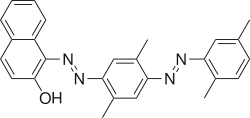Oil Red O
 | |
| Names | |
|---|---|
| IUPAC name
1-(2,5-dimethyl-4-(2,5-dimethylphenyl) phenyldiazenyl) azonapthalen-2-ol | |
| Identifiers | |
| 1320-06-5 | |
| 3D model (Jmol) | Interactive image |
| ChEBI | CHEBI:88213 |
| ChemSpider | 14217961 |
| ECHA InfoCard | 100.013.906 |
| MeSH | oil+red+O |
| PubChem | 5841742 |
| |
| |
| Properties | |
| C26H24N4O | |
| Molar mass | 408.49496 |
| Except where otherwise noted, data are given for materials in their standard state (at 25 °C [77 °F], 100 kPa). | |
| | |
| Infobox references | |
Oil Red O (Solvent Red 27, Sudan Red 5B, C.I. 26125, C26H24N4O) is a lysochrome (fat-soluble dye) diazo dye used for staining of neutral triglycerides and lipids on frozen sections and some lipoproteins on paraffin sections. It has the appearance of a red powder with maximum absorption at 518 (359)nm.
Uses
Oil Red O is one of the dyes used for Sudan staining. Similar dyes include Sudan III, Sudan IV, and Sudan Black B. The staining has to be performed on fresh samples, as alcohol fixation removes most lipids.
Oil Red O largely replaced Sudan III and Sudan IV, as it provides much deeper red color and the stains are therefore much easier to see.
In pyrotechnics, Oil Red O is used in some compositions of red colored smokes. It is also used for making dyes.
Forensic
When staining, Oil Red O can make fat more visible in various cuts in pathology.[1]
It is also used in a technique (the method is called as the dye: Oil Red O), discovered in 2004 by Alexandre Beaudoin, for staining latent fingerprints.[2] This technique allows the development of latent fingerprints on porous exhibits (such as paper, cardboard, etc.) that are dry or wet.
It mainly targets fat deposits on the surface of porous exhibits.[3] It is a non-destructive technique (which does not destroy the exhibit and doesn’t prevent the use of other techniques).
It is a safe alternative to the Physical Developer method,[4] and is also used in sequence with other methods of fingerprints development.[5]
References
- ↑ "Forensic Pathology".
- ↑ Triplett M, Fingerprint Dictionary, Two Rings Publishing, Bellevue, Washington.
- ↑ Beaudoin, A. New technique for revealing latent fingerprints on wet, porous surfaces: Oil Red O. Journal of Forensic Identification, 2004, 54 (4), 413-421.
- ↑ Rawji, A. ; Beaudoin, A. Oil Red O versus Physical Developer on wet papers: a comparative study. Journal of Forensic Identification, 2006, 56 (1), 33-54.
- ↑ Guigui, K.; Beaudoin, A. The use of Oil Red O in sequence with other methods of fingerprint development. Journal of Forensic Identification, 2007, 57 (4), 550-581.
External links
- Stains File entry